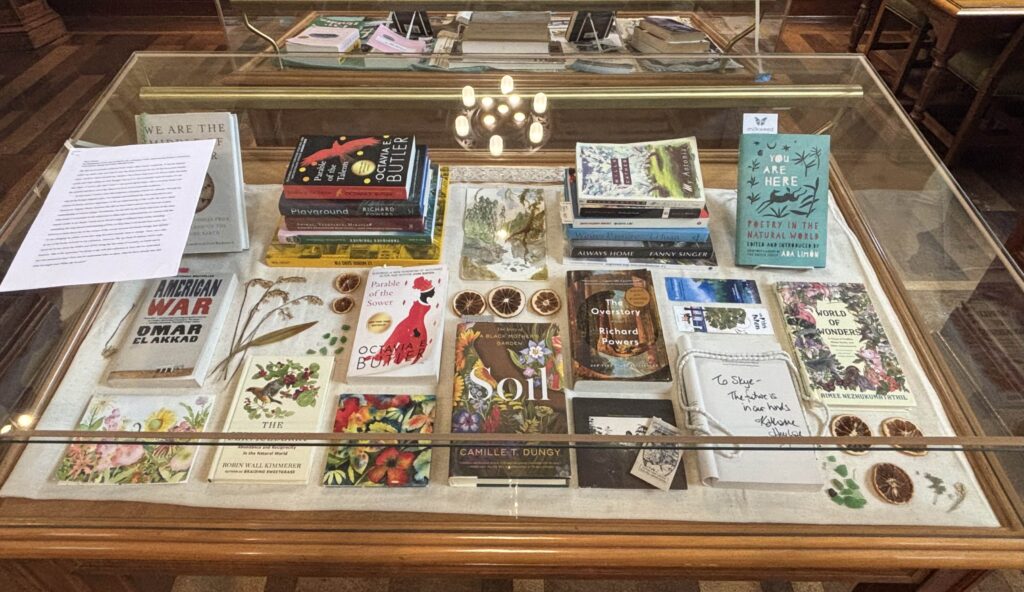Amelie Lee ’23
Editor-in-Chief
As a person who is embarrassingly intimidated by all things STEM, I’ve unsurprisingly never been drawn to the science fiction section of bookstores. While I have no problem dipping my toes into book genres of fantasy, romance, or horror, sci-fi has always felt threatening to me. I accredit this fear to two things: firstly, my very poor record of success in past science classes, and secondly, a slightly irrational fear of being excluded from the club of science-fiction fans. I’ve always associated sci-fi with an unflattering stereotype of gatekeeping men who quiz outsiders on whether they know sufficient Star Trek trivia, and I’ve always felt nervous to approach anything tangential to that world.
Recently, I overcame my fear and spent my winter break reading a handful of sci-fi novels and short stories. It was only upon reading Ted Chiang’s two collections of short stories that I realized just how much I had been missing by excluding the sci-fi genre from my book lists. Chiang, who has won numerous awards for his work, is most well known for writing “Story of Your Life,” the novella which Oscar winning movie “Arrival” is based on.
While my past experience with speculative sci-fi is admittedly limited, Chiang blew any expectations away with his short stories, quickly becoming one of my favorite authors. Reading Chiang’s stories can only be compared to watching “Black Mirror” — if “Black Mirror” was a thousand times better than it actually is. Chiang writes technology that is simultaneously impossibly futuristic yet plausible, using detailed science-based writing to ground his more outlandish ideas.
In his stories, Chiang flawlessly brings his readers into worlds with innovative technology — devices that allow you to talk to a version of yourself from an alternative universe in “Anxiety is the Dizziness of Freedom,” medical procedures that eliminate bias towards attractive people in “Liking What You See: A Documentary,” and time-travel in “The Merchant and the Alchemist’s Gate.” Much like “Black Mirror,” Chiang’s writing succeeds by connecting speculative technology to human nature. With his storylines and philosophical style of writing, Chiang links his sci-fi worlds to human relationships and psychology in a way that is realistic and well-developed. In every story, his characters shine through, engaging readers further into the stories’ theoretical concepts. In his stories without creative futuristic technology, like “Hell is the Absence of God,” the worlds Chiang develops are used to focus on character growth, self-reflection, and innovation.
After reading Chiang, I started to delve into the “classics” of the genre, trying out Isaac Asimov, Terry Prachett, and Neil Gaiman. While I liked some books more than others, I noticed that there seemed to be an overarching problem with inclusivity — one that isn’t connected with elitist fans and gatekeeping. When stories operate in future-focused speculative worlds that challenge my preconceptions of technology and perception, a lack of racial or gender inclusivity suddenly becomes extremely evident.
While reading, I couldn’t help but think: How is it possible that this world that has reading robot animals doesn’t feature a single LGBTQ+ individual? It feels confusing and old-fashioned when a world where people can travel at light speed doesn’t seem to have any women involved in the process of space travel. Reading Pratchett’s 2004 “Going Postal,” I explored chapter after chapter of male presenting guards, golems, and con-artists, just to finally meet a singular female love interest, who the protagonist characterizes as sexy for smoking a cigarette.
This isn’t to say that all of these authors work reads as inherently sexist or homophobic — just that my experience exploring beautifully done science fiction was diminished by a stark lack of inclusivity.
Not only does a lack of inclusivity seem egregious when surrounded by mind-blowing technology, sci-fi writers often fail to capitalize on the progressive potential of speculative fiction. It’s rare that an author can operate in a space where modern societal norms are completely thrown out the window, but in speculative sci-fi or fantasy, authors can create worlds that operate entirely separately from gender norms, racism, and heteronormativity as we know it. Sci-fi and fantasy can explore those boundaries in a way that normal fiction cannot — having the unique ability to push readers’ boundaries of how they see the world. In the sci-fi I’ve read so far, I can’t help but feel disappointed that this potential isn’t acted upon, especially as the demographics of science fiction have historically skewed male, only slowly evolving to be more inclusive.
This isn’t to say that authors aren’t already doing so; there have been sci-fi writers that have been exploring the limitations of gender in their works for decades. While I’m excited to dive into these stories soon, (I’ve put Ursula K. Le Guin next on my list) I’m still frustrated in the lack of inclusion in the mainstream “classic” stories that I’ve read so far.
While most of Chiang’s work doesn’t focus on societal injustice, his most recent piece does — showing exactly how powerful progressive sci-fi can be. In a series by New York Times called “Op-Eds from the Future,” sci-fi authors wrote fictional editorials that they imagine might be read decades into the future. Ted Chiang’s 2019 contribution, “It’s 2059 and Rich Kids are Still Winning,” explores a world where DNA alteration is accessible — but mostly to the wealthy. The New York Times wrote that their goal with this series was to show how speculative science fiction could show that “The challenges they predict are imaginary — for now — but their arguments illuminate the urgent questions of today and prepare us for tomorrow.”
Chiang’s fictional editorial accomplishes this goal beautifully, with arguments that address the scientific implications of DNA technology, but also its human consequences — with Chiang connecting his fictional futuristic argument to social patterns that are clear in our world today. Chiang imagines an incredibly realistic racial and economic discourse that would follow the development of DNA alteration, and his commentary is clear. Chiang’s editorial leaves the reader understanding that developing technology will likely reinforce current systems of discrimination and may hurt marginalized communities. Using this fictional sci-fi editorial, Chiang creates an argument that uses both current and fictional understanding of societal systems, pushing the reader to consider the social implications of all human progress in a way that would be impossible for any other genre of literature.
The power of “It’s 2059 and Rich Kids are Still Winning” perfectly illustrates the missed potential of sci-fi that fails to incorporate inclusivity into their stories. Sci-fi and fantasy are uniquely positioned to break down existing societal barriers, and sci-fi authors should jump at the chance to redefine boundaries keeping us from a more inclusive future.
Image Source: The New Yorker





